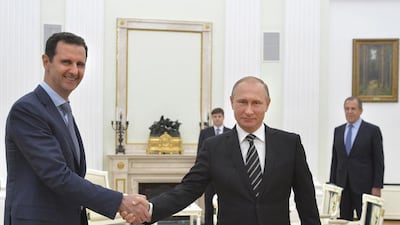The ramifications of Russia’s increased influence in the Middle East – and particularly on the Israeli-Palestinian conflict – drew the attention of several commentators from the Arabic media.
Salim Nassar, a columnist in the London-based daily Al Hayat, noted that the campaign had not received the attention of the Israeli prime minister.
“In his latest statements, Mr Netanyahu mentioned his fear of a possible political initiative by president Barack Obama before the end of his term,” he wrote.
“The White House described this initiative as drawing its inspiration from the road map proposed by the American administration in 2003. While Palestinian president Mahmoud Abbas agreed to it, the Israeli government only gave its reluctant approval.”
On the other hand, Russian president Vladimir Putin has sent his deputy minister of foreign affairs, Mikhail Bogdanov, to the region in a bid to convince Mr Netanyahu to take part alongside Mr Abbas in a summit to be held in Moscow next month.
“Mr Putin’s idea was criticised by the French press which claimed that its aim was to undermine the initiative taken by his French counterpart,” said Nassar.
However, he noted, the Russian president is considering the Middle East issue from an entirely different perspective.
“There is talk among Mr Putin’s aides that he is looking forward to the upcoming presidency of Donald Trump or Hillary Clinton. He does not believe Barack Obama’s claim that his country is busy with the rise of China or India in the coming phase, but is convinced that the US will lose its international shine and will withdraw beyond the Atlantic as an isolated power.
“A case in point is the Middle Eastern countries have been cooperating with Washington for over half a century but are now gravitating towards Moscow, given the latter’s effect on the latest developments,” he concluded.
Palestinian columnist Nabil Amro, writing in Asharq Al Awsat, noted that Mr Putin's efforts to hold a meeting between Mr Netanyahu and Mr Abbas at the Kremlin have failed.
However, he did not consider this to be the end of the matter.
“As long as it is limited to a meeting under the auspices of a host favoured by both parties, it is still possible and may even be held in the near future,” he wrote.
Amro saw Israel as keen on maintaining its new-found relationship with yesterday’s enemy, now that Russian is widely spoken in Israel and former Soviet citizen Avigdor Lieberman has been appointed Israel’s defence minister.
“The common interests between Russia and Israel have developed and expanded, with Russia becoming a border state through its active role in Syria,” he said.
“Israel will not allow Mr Putin what it has not allowed Mr Obama, and its dealings with Moscow regarding the Palestinian issue will be limited to accepting its hosting of that meeting without this leading to any other arrangements, namely the relaunching of the political process.”
He said that anything more ambitious would be forbidden by Israel, and also by the United States. Amro noted that it would not be easy for Mr Abbas to say no to the Russians.
He concluded that Palestinians now stand in a familiar position, with the prospect of talks that will have only a modest outcome, if any at all.
This is, he said, “an equation sufficiently evidenced by over half a century of attempts and experience”.
Translated by Jennifer Attieh
translation@thenational.ae

